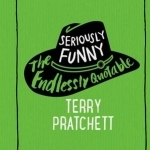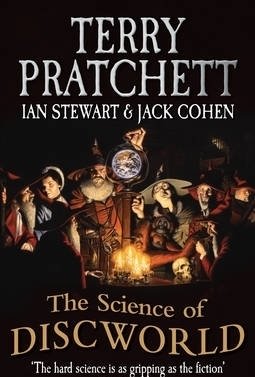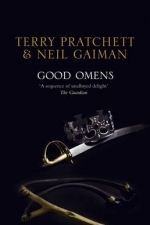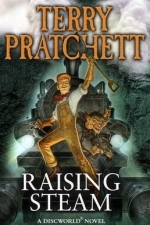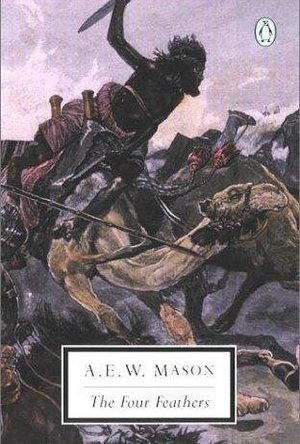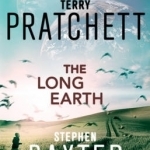Search
Mike (8 KP) rated Seriously Funny: The Endlessly Quotable Terry Pratchett in Books
Oct 10, 2018
Lovely looking little book, smaller than I was expecting, but it is really nice. No dust jacket but a nice thick textured cover and inner pages that make you feel dizzy!
I read it this evening and I'll be completely honest - I was a bit disappointed, although it is a pretty book, it is also pretty thin - 128 pages.including a title page, printing information page, contents page, blank page, Overview, another blank page, 1 page mini bio, 105 quotes*, 4 pages of "By Terry Pratchett" lists.
I think that for £9.99 they could have found more than 105 "seriously funny" quotes from over 50 books and other sources - there isn't even one from each Discworld book. Even some illustrations would have been nice (9 repeats of the same hat picture is not very exciting).
Obviously as a collectore I had to buy it - as will most of us, does it does seem a bit of a "cash in" just to make money out of us, they are pretty much guaranteed to sell over a million copies so they could have made it more substantial for the money.
Still made me laugh out loud a couple of times though.
*One quote per page, separated by title pages
I read it this evening and I'll be completely honest - I was a bit disappointed, although it is a pretty book, it is also pretty thin - 128 pages.including a title page, printing information page, contents page, blank page, Overview, another blank page, 1 page mini bio, 105 quotes*, 4 pages of "By Terry Pratchett" lists.
I think that for £9.99 they could have found more than 105 "seriously funny" quotes from over 50 books and other sources - there isn't even one from each Discworld book. Even some illustrations would have been nice (9 repeats of the same hat picture is not very exciting).
Obviously as a collectore I had to buy it - as will most of us, does it does seem a bit of a "cash in" just to make money out of us, they are pretty much guaranteed to sell over a million copies so they could have made it more substantial for the money.
Still made me laugh out loud a couple of times though.
*One quote per page, separated by title pages
David McK (3705 KP) rated Snuff (Discworld, #39; City Watch #8) in Books
Jan 28, 2019
OK, this is a Pratchett, so the fact that it is good is pretty much a given.
I have to say, however, that I've found his latest Discworld books to be 'less good' - perhaps a sympton of his sad mental decline? - than what I would term a late-middle period Pratchett (round about 'Lords and Ladies', 'Jingo' and so on). In this one, he returns to Commander Vimes of the Ankh-Morpork City Watch - last featured in 'Thud!', who is on holiday in the country-side. Of course, as the blurb makes clear, it is inevitable that this turns into a Busmans holiday ...
The novel did have a few laugh-out-loud moments, but not as many as from one of his best. I also found it to be rather verbose at times, with only really one extended action scene. While some characters - Willikens, in particular - are more fleshed out than before, I also got the distinct feeling that other members of the City Watch were only (temporarily) present as it wouldn't be a City Watch book without them; not to add anything to the story.
While that might make it sound like I didn't enjoy the book, that's simply not true - I did, but just felt that it could have been so much more ...
I have to say, however, that I've found his latest Discworld books to be 'less good' - perhaps a sympton of his sad mental decline? - than what I would term a late-middle period Pratchett (round about 'Lords and Ladies', 'Jingo' and so on). In this one, he returns to Commander Vimes of the Ankh-Morpork City Watch - last featured in 'Thud!', who is on holiday in the country-side. Of course, as the blurb makes clear, it is inevitable that this turns into a Busmans holiday ...
The novel did have a few laugh-out-loud moments, but not as many as from one of his best. I also found it to be rather verbose at times, with only really one extended action scene. While some characters - Willikens, in particular - are more fleshed out than before, I also got the distinct feeling that other members of the City Watch were only (temporarily) present as it wouldn't be a City Watch book without them; not to add anything to the story.
While that might make it sound like I didn't enjoy the book, that's simply not true - I did, but just felt that it could have been so much more ...
Phil Leader (619 KP) rated The Science of Discworld in Books
Nov 25, 2019
If there was an award for most misleadingly titled book, this would on the shortlist. Not only is it most definitely not about the science of Discworld, it is also not some sort of shameless cash-in on a well-loved author.
What this book is, then, is a 'popular science' book, dressed up with some (typically amusing) interludes featuring the wizards of Unseen University as they try to understand how our world can work without magic and stories. Pratchett was always keen to educate, and here he tries to condense science into a single volume, using co-authors and science writers Ian Stewart and Jack Cohen to do the hard lifting of explaining the basics and discoveries of physics, chemistry and biology.
The authors try to explain how everything really works, although they do acknowledge there is bound to be simplification (or 'lies to children') as some of the concepts are hugely complex. But it never gets boring or too difficult to read.
A superb book for anyone who just wants to understand a little bit more about science. And I still use the space elevator analogy to this day. A gem of a book, shame about the title.
What this book is, then, is a 'popular science' book, dressed up with some (typically amusing) interludes featuring the wizards of Unseen University as they try to understand how our world can work without magic and stories. Pratchett was always keen to educate, and here he tries to condense science into a single volume, using co-authors and science writers Ian Stewart and Jack Cohen to do the hard lifting of explaining the basics and discoveries of physics, chemistry and biology.
The authors try to explain how everything really works, although they do acknowledge there is bound to be simplification (or 'lies to children') as some of the concepts are hugely complex. But it never gets boring or too difficult to read.
A superb book for anyone who just wants to understand a little bit more about science. And I still use the space elevator analogy to this day. A gem of a book, shame about the title.
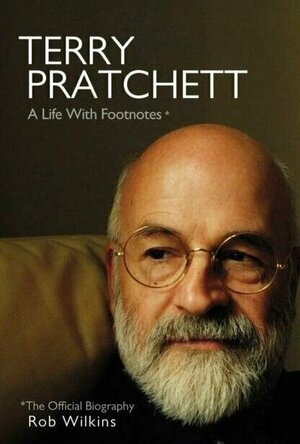
Terry Pratchett: A Life with Footnotes
Book
'PEOPLE THINK THAT STORIES ARE SHAPED BY PEOPLE. IN FACT, IT'S THE OTHER WAY AROUND.' At the time...
Ross (3284 KP) rated Good Omens in Books
Jun 12, 2019
Fun, charming romp towards the end of the world
Good Omens is a strange one. If you're a fan of Pratchett's Discworld, I can see you not being overly keen on this book (while his trademark humour is there and his funny Billy Connolly-esque tangents are in the footnotes, there is less of the fantastic about it). And likewise Gaiman fans might be missing his usual gothic flair and be somewhat alarmed at the amount of silliness in the book.
This is probably what put me off reading this until now. I seem to recall trying to read it about 20 years ago, but for some reason I gave up inside a couple of pages. That was 17 year old me as a Pratchett fan, and I must have opted for the 20+ Discworld books I still had yet to read instead, and had no idea who Neil Gaiman was.
Sadly, that makes me your common or garden bandwagon-jumper as I have only now read this for the first time with the TV series on my to-be-watched list.
I cannot say why I never returned to the book. I love Pratchett, had the honour of meeting him at signings a few times in the 90s, and he got me into Robert Rankin, Douglas Adams, Tom Holt and Tom Sharpe. This book is so in line with the flavour of the books I have enjoyed most in my life that it beggars belief I never gave it another thought.
I am so glad I eventually did, and did so before watching the TV series.
While there are epic expectations of the quality of the book, from the hype and cult status, I always read with an open mind.
The story underlying the book is a Fawlty Towers-esque attempt at the end of days, where one bumbling fool's error in the early stages completely changes the plans for the end of the human race.
I won't go into the plot in detail, and will only say that the read is a thoroughly enjoyable ride. It isn't laugh-out-loud funny, it is smirk-I-know-what-you-mean funny. This may not appeal to non-British readers as much as it is written with a very British sense of humour. It is very silly quite a lot of the time, but there is a good, deep story in there if you take a moment to think about it.
My only criticism would be that there was a little too much silliness and while enjoyable this may have distracted from the book at times. But you know you'll get that with Pratchett, he takes his little tangents and he adds in nonsense dialogues for sheer entertainment value - he very much sees that not every word has to be vital to the overall story, you can have a little fun along the way.
Now, to get into the TV series ....
This is probably what put me off reading this until now. I seem to recall trying to read it about 20 years ago, but for some reason I gave up inside a couple of pages. That was 17 year old me as a Pratchett fan, and I must have opted for the 20+ Discworld books I still had yet to read instead, and had no idea who Neil Gaiman was.
Sadly, that makes me your common or garden bandwagon-jumper as I have only now read this for the first time with the TV series on my to-be-watched list.
I cannot say why I never returned to the book. I love Pratchett, had the honour of meeting him at signings a few times in the 90s, and he got me into Robert Rankin, Douglas Adams, Tom Holt and Tom Sharpe. This book is so in line with the flavour of the books I have enjoyed most in my life that it beggars belief I never gave it another thought.
I am so glad I eventually did, and did so before watching the TV series.
While there are epic expectations of the quality of the book, from the hype and cult status, I always read with an open mind.
The story underlying the book is a Fawlty Towers-esque attempt at the end of days, where one bumbling fool's error in the early stages completely changes the plans for the end of the human race.
I won't go into the plot in detail, and will only say that the read is a thoroughly enjoyable ride. It isn't laugh-out-loud funny, it is smirk-I-know-what-you-mean funny. This may not appeal to non-British readers as much as it is written with a very British sense of humour. It is very silly quite a lot of the time, but there is a good, deep story in there if you take a moment to think about it.
My only criticism would be that there was a little too much silliness and while enjoyable this may have distracted from the book at times. But you know you'll get that with Pratchett, he takes his little tangents and he adds in nonsense dialogues for sheer entertainment value - he very much sees that not every word has to be vital to the overall story, you can have a little fun along the way.
Now, to get into the TV series ....
David Gemmell is/was one of my favourite authors.
However, he passed away in 2006 while finishing the final novel in his <i>Troy</i> trilogy (<i>Fall of Kings</i>), which was then finished by his second wife Stella.
<i>The City</i> is her first fully solo outing. Following recent trends, this definitely weighs in on the 'epic' side of the fantasy scales: think 'A Game of Thrones', where one novel is the size of three what I would term 'normal' reads. Indeed, the novel itself is split into various sections: personally I feel that it could have been split into two or maybe three separate books rather than under the one cover.
<i>The City</i> of the title (which is never actually named) is ancient and bloated, locked in an endless war with its enemies. Built over centuries, it reminded me somewhat of a passage in one of Pratchett's Discworld books (I forget which, and referring to Ankh-Morpork), something along the lines of:
'the main thing Ankh-Morpork is built on is Ankh-Morpork'.
That could be a pretty fair description of The City as well!
I also found some sections to be slow-moving, and while I never lost interest in the story, it also never really grabbed me, seeming to lack that certain something to turns a good story into a great story.
Would I read more by Stella Gemmell? At the moment, I'm undecided.
However, he passed away in 2006 while finishing the final novel in his <i>Troy</i> trilogy (<i>Fall of Kings</i>), which was then finished by his second wife Stella.
<i>The City</i> is her first fully solo outing. Following recent trends, this definitely weighs in on the 'epic' side of the fantasy scales: think 'A Game of Thrones', where one novel is the size of three what I would term 'normal' reads. Indeed, the novel itself is split into various sections: personally I feel that it could have been split into two or maybe three separate books rather than under the one cover.
<i>The City</i> of the title (which is never actually named) is ancient and bloated, locked in an endless war with its enemies. Built over centuries, it reminded me somewhat of a passage in one of Pratchett's Discworld books (I forget which, and referring to Ankh-Morpork), something along the lines of:
'the main thing Ankh-Morpork is built on is Ankh-Morpork'.
That could be a pretty fair description of The City as well!
I also found some sections to be slow-moving, and while I never lost interest in the story, it also never really grabbed me, seeming to lack that certain something to turns a good story into a great story.
Would I read more by Stella Gemmell? At the moment, I'm undecided.
Phil Leader (619 KP) rated Raising Steam: (Discworld Novel 40) in Books
Nov 25, 2019
Raising Steam is another Diskworld book by Pratchett and I have to say I enjoyed it immensely.
The main plot is twofold, firstly concerning steam trains being created (with a nice nod to Reaper Man) and spreading across the Sto Plains and secondly the continuation of the story of the Dwarves from The Fifth Elephant and Thud. There is also some continuation of the Goblin thread from Snuff. As Moist von Lipwig is the main hero (of a sort) there are also references to Going Postal and Making Money (which is also where the title comes from - this is a Moist book).
The main plots only converge towards the end of the story but this doesn't really matter. The train story is fun and fast moving, some nice little nods to the steam pioneers on Roundworld thrown in, plenty of one liners and puns. There are also more than enough references to previous books and Rincewind makes an appearance (although Death only has a cameo and there's no Librarian which is a little disappointing). The Dwarf plot concerns the machinations of the Deep Downers in trying to preserve Dwarven ways and not to modernise.
Both have impetus and are just enough entwined that one plot didn't get left behind. The writing was crisp and well paced - Pratchett seems to have finally adapted to speaking the books rather than physically writing them.
Overall I enjoyed this immensely, certainly the one I've enjoyed the most since Going Postal. Certainly there are some flaws - Drumknott is subverted from being a dry dusty administrator and the railway is simply built too quickly - but these can easily be overcome by the reader.
Recommended for any Discworld fan. Possibly not a good introduction as there are too many knowing nods and references to previous works.
The main plot is twofold, firstly concerning steam trains being created (with a nice nod to Reaper Man) and spreading across the Sto Plains and secondly the continuation of the story of the Dwarves from The Fifth Elephant and Thud. There is also some continuation of the Goblin thread from Snuff. As Moist von Lipwig is the main hero (of a sort) there are also references to Going Postal and Making Money (which is also where the title comes from - this is a Moist book).
The main plots only converge towards the end of the story but this doesn't really matter. The train story is fun and fast moving, some nice little nods to the steam pioneers on Roundworld thrown in, plenty of one liners and puns. There are also more than enough references to previous books and Rincewind makes an appearance (although Death only has a cameo and there's no Librarian which is a little disappointing). The Dwarf plot concerns the machinations of the Deep Downers in trying to preserve Dwarven ways and not to modernise.
Both have impetus and are just enough entwined that one plot didn't get left behind. The writing was crisp and well paced - Pratchett seems to have finally adapted to speaking the books rather than physically writing them.
Overall I enjoyed this immensely, certainly the one I've enjoyed the most since Going Postal. Certainly there are some flaws - Drumknott is subverted from being a dry dusty administrator and the railway is simply built too quickly - but these can easily be overcome by the reader.
Recommended for any Discworld fan. Possibly not a good introduction as there are too many knowing nods and references to previous works.

Shakes and Fidget
Games and Entertainment
App
Shakes and Fidget is a fun fantasy RPG satire and an award-winning role-playing game at the same...
David McK (3705 KP) rated The Four Feathers in Books
Jan 28, 2019
'Every man would be a coward where he but brave enough' is a quote that I thought came from this novel.
Turns out I was wrong on both counts - the actual quote is 'For all men would be cowards if they durst', and was actually written by John Wilmot, the Earl of Rochester in his poem "A Satyr against Reason and Mankind" roughly 2 centuries before the publication of this novel.
It's also a line that Mason, ad the others of his generation, would have had absolutely no understanding of and would (probably) have been vehemently against, as depicted in the events of this story.
This story starts on the eve of his regiment sailing off to fight in Sudan, when Harry Feversham resigns his commission, having just gotten engaged to his fiancee. When his 'friends' find out they send him three white feathers - the symbols of cowardice - which he receives in the company of that fiancee, who adds a fourth.
In a bid to retain his honour - valued above all else by the Colonial British of the time - Harry hatches a plan to go under-cover to Sudan, looking for opportunities to prove his bravery to those friends and (finally) his fiancee so they will take their feather back.
(Personally, I don't know why he didn't just do the same as Nobby Nobs in [a:Terry Pratchett|1654|Terry Pratchett|https://d.gr-assets.com/authors/1235562205p2/1654.jpg]'s [b:Jingo|47990|Jingo (Discworld, #21)|Terry Pratchett|https://d.gr-assets.com/books/1327921813s/47990.jpg|1128623], and save said feathers for a mattress ... )
The result is very much a book of its time, very much a 'boys-own' story of Harry and his daring escapades in the Sudan. It's also very much so a novel that needs read with that in mind: to modern minds, the entire premise might seem a little rickety (would someone really go to those extremes just to 'prove' their bravery?), but such was the mores of the day.
Turns out I was wrong on both counts - the actual quote is 'For all men would be cowards if they durst', and was actually written by John Wilmot, the Earl of Rochester in his poem "A Satyr against Reason and Mankind" roughly 2 centuries before the publication of this novel.
It's also a line that Mason, ad the others of his generation, would have had absolutely no understanding of and would (probably) have been vehemently against, as depicted in the events of this story.
This story starts on the eve of his regiment sailing off to fight in Sudan, when Harry Feversham resigns his commission, having just gotten engaged to his fiancee. When his 'friends' find out they send him three white feathers - the symbols of cowardice - which he receives in the company of that fiancee, who adds a fourth.
In a bid to retain his honour - valued above all else by the Colonial British of the time - Harry hatches a plan to go under-cover to Sudan, looking for opportunities to prove his bravery to those friends and (finally) his fiancee so they will take their feather back.
(Personally, I don't know why he didn't just do the same as Nobby Nobs in [a:Terry Pratchett|1654|Terry Pratchett|https://d.gr-assets.com/authors/1235562205p2/1654.jpg]'s [b:Jingo|47990|Jingo (Discworld, #21)|Terry Pratchett|https://d.gr-assets.com/books/1327921813s/47990.jpg|1128623], and save said feathers for a mattress ... )
The result is very much a book of its time, very much a 'boys-own' story of Harry and his daring escapades in the Sudan. It's also very much so a novel that needs read with that in mind: to modern minds, the entire premise might seem a little rickety (would someone really go to those extremes just to 'prove' their bravery?), but such was the mores of the day.
Phil Leader (619 KP) rated The Long Earth in Books
Nov 20, 2019
Step Day. A day that changed the world. A day when the designs for a strange device went viral. Relatively simple to make with a few electronic components and a potato, this small device allowed most people to move sideways into a parallel dimension... and from there they could keep going exploring multiple copies of Earth, each different and all of them untouched and available for colonisation by the population of the overcrowded, overdeveloped and worn out original.
Joshua Valiente is an orphan who discovers that he doesn't actually need a box to move dimensions - to Step - he is a natural, like a few others before him that have already discovered what becomes known as the Long Earth and have kept it to themselves. Big business isn't slow to take advantage, particularly the huge, powerful and shadowy Black Corporation, whose distributed super computer Lobsang claims to be the reincarnation of a Tibetan mechanic. Together Joshua and Lobsang will discover a few of the secrets of the Long Earth, as well as witnessing the worst it brings out in humanity.
With this central idea, Pratchett and Baxter tell the tales of various people affected by the events of Step Day in very different ways. As with the rest of humanity, the narrative is restless, keen to both rush out and see how far along the Long Earth it can travel and to watch how it turns the Earth we all know on its head. This is a book of wonders, a little like Gulliver's Travels in finding interesting variations to explore.
Those expecting the usual slew of jokes, gags, footnotes and humorous characters that typify his Discworld novels will be disappointed. There are light touches to the situations and characters that betray his hand but this is straight science fiction by two great authors who between them manage to convey the huge scale of thousands - millions - of Earths while still being able to tell the story from a human perspective.
Joshua Valiente is an orphan who discovers that he doesn't actually need a box to move dimensions - to Step - he is a natural, like a few others before him that have already discovered what becomes known as the Long Earth and have kept it to themselves. Big business isn't slow to take advantage, particularly the huge, powerful and shadowy Black Corporation, whose distributed super computer Lobsang claims to be the reincarnation of a Tibetan mechanic. Together Joshua and Lobsang will discover a few of the secrets of the Long Earth, as well as witnessing the worst it brings out in humanity.
With this central idea, Pratchett and Baxter tell the tales of various people affected by the events of Step Day in very different ways. As with the rest of humanity, the narrative is restless, keen to both rush out and see how far along the Long Earth it can travel and to watch how it turns the Earth we all know on its head. This is a book of wonders, a little like Gulliver's Travels in finding interesting variations to explore.
Those expecting the usual slew of jokes, gags, footnotes and humorous characters that typify his Discworld novels will be disappointed. There are light touches to the situations and characters that betray his hand but this is straight science fiction by two great authors who between them manage to convey the huge scale of thousands - millions - of Earths while still being able to tell the story from a human perspective.
